Are you looking forward to knowing about in details of 36 inches? In this expert guide, I will delve into the measurement, we just explore How Long or Big Is 36 Inches, Honestly is.
Whether you’re diving into a DIY home improvement task, deliberating the ideal TV size, or just inquisitive about unit conversions, it’s crucial to grasp the tangible dimensions of 36 inches. Join us on this expedition through measurements as we uncover the importance of 36 inches.
Write in different way, 36 inches is equivalent to 3 feet, making it a yard in length. In metric terms, it is approximately 91.44 centimeters. This measurement is commonly used for items like rulers, TV screens, and fabric rolls, providing a versatile gauge for various objects’ dimensions.
Let’s delve into the fundamentals: What is an inch?
Before we delve into the details of 36 inches, it’s important to lay a strong groundwork by grasping the concept of what an inch represents. An inch serves as a fundamental unit of measurement for length in both the Imperial and United States Customary systems. Typically, it is represented by the symbol “in” or the double prime (“).
Everyday Examples: Visualizing 36 Inches
The following are some examples of 36 inches in your daily life:
Example 1: The height of a standard folding table
A typical foldable table stands at approximately the height of a yardstick, measuring around 3 feet or 36 inches. This height proves to be quite versatile, suiting various activities such as dining, crafting, or working. It’s worth noting that specific folding tables may exhibit slight variations in height due to differences in design and intended usage. However, a standard folding table typically hovers around the 36-inch mark in terms of its height.
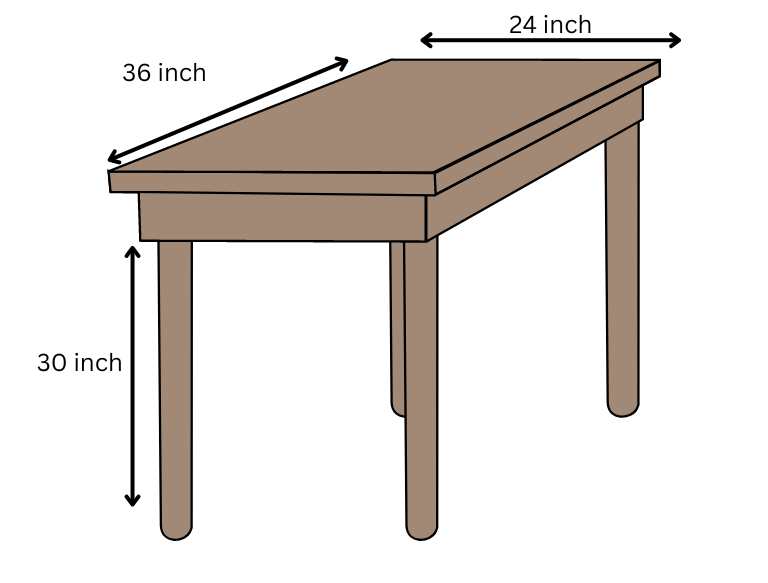
Example 2: The diameter of a bicycle wheel
The typical diameter of a standard bicycle wheel usually hovers around 36 inches. This dimension is likely to strike a chord with anyone who has spent time pedaling on two wheels. It stands as a widely recognized measurement, shedding light on the wheel’s magnitude and its role in defining the bike’s overall proportions.
While various bike variants may exhibit slight deviations in wheel sizes, the ballpark figure of approximately 36 inches remains a widely accepted standard for numerous bicycles.
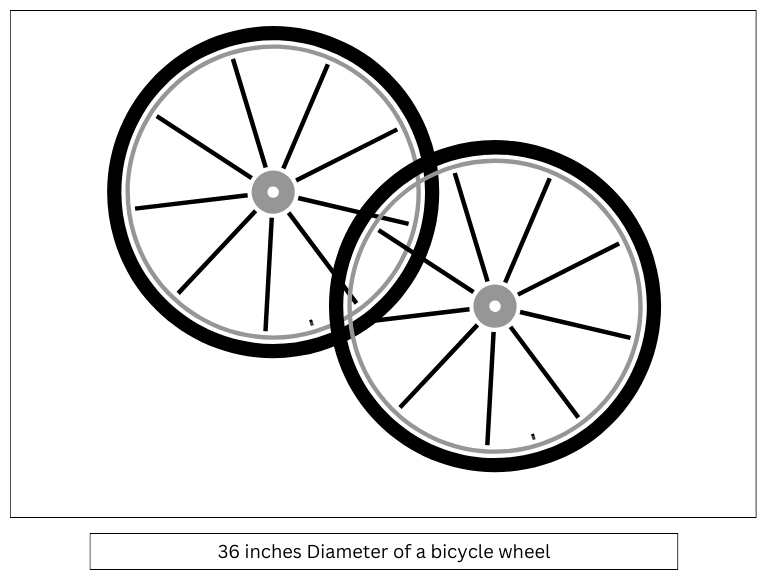
Example 3: The height of a 3-foot-tall toddler
Imagine a small toddler who has recently taken their first steps, standing at a mere 3 feet in height.
This height closely resembles the length of a standard yardstick. When you envision this tiny child, it becomes easier to grasp the true length of 36 inches.
It’s a measurement that feels relatable because you may have encountered or observed children of this stature.

3-foot or 36-inch tall toddler
Example 4: The average width of a standard door
Imagine a young toddler taking their very first steps. To grasp the concept of the width of a typical interior door, envision a common indoor door you’ve encountered.
In most cases, these interior doors measure approximately 36 inches in width. This dimension holds significance as doors are ubiquitous in both residential and office settings.
Simply conjure up the image of a door you’ve come across in the past, and it will provide you with a tangible sense of just how expansive 36 inches truly is.
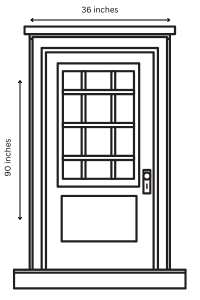
36 inches width of a standard door
Example5: The wingspan of a red-tailed hawk
Imagine a young child taking their first wobbly steps, just beginning to explore the world on two unsteady feet. Now, shift your focus to the majestic red-tailed hawk, a remarkable bird renowned for its striking wingspan.
Spanning an impressive 36 inches from tip to tip, the wings of this bird command our admiration and curiosity.
Contemplating a hawk in flight, one can truly grasp the magnitude of this 36-inch measurement.
It invites us to ponder the vast and intricate world that surrounds us, prompting us to marvel at the wonders of nature.
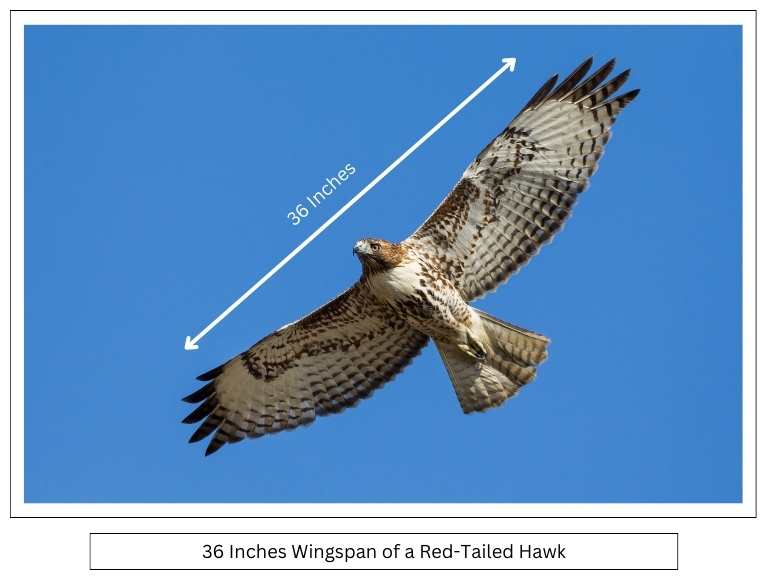
Example 6: The diagonal measurement of a 36-inch flat-screen TV
Let’s take a moment to think about the flat-screen television in your home. Its screen spans roughly 36 inches from one corner to the opposite corner. What’s fascinating is that this size is quite common in many households.
So, as you settle in to enjoy your favorite shows, ponder the diagonal measurement of 32 inches, which is very close to the overall 36-inch size, and visualize how it seamlessly fits within your living space.
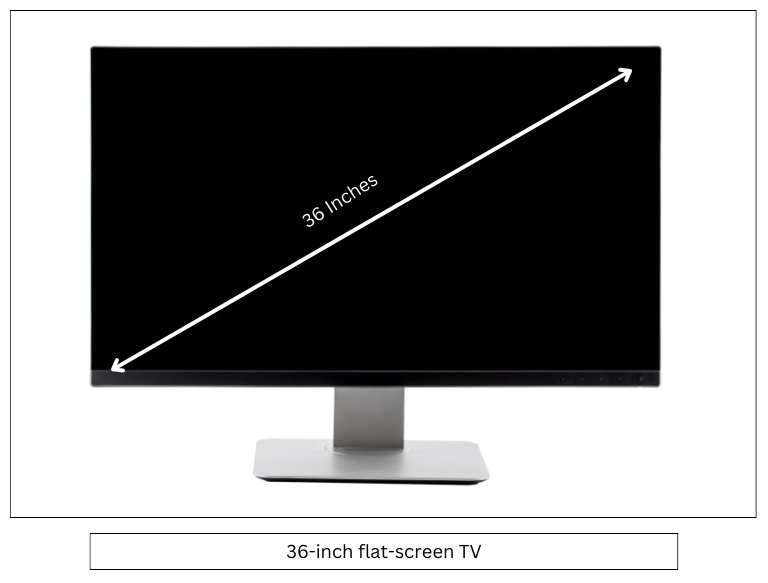
Example 7: The height of a 3-tier cat tree
Imagine a unique cake designed specifically for children’s enjoyment, featuring three distinct levels. The entire cake stands at a towering 36 inches in height, roughly equivalent to 3 feet.
This becomes particularly captivating when you consider the delight it brings to kids, who have an innate passion for both indulging in delicious treats and engaging in playful activities. Envision a petite cake crafted exclusively for their pleasure, and you’ll grasp the impressive stature of this 36-inch masterpiece.
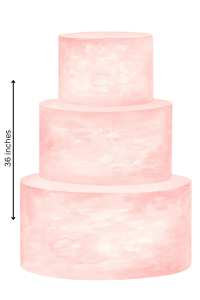
3-tier cake- How long or Big is 36 inches?
Example8: The width of a standard kitchen range (stove)
Consider the stove nestled in your kitchen, the trusty companion where you craft your culinary creations. Typically, the stove boasts a width of approximately 36 inches. This dimension holds significance because cooking is a universal endeavor, a daily ritual for many.
So, as you conjure the image of your stove in your mind’s eye, you can appreciate the tangible breadth of 36 inches. It serves as a bridge, linking a familiar, everyday appliance to a quantifiable measure that effortlessly takes shape in your imagination.

Example 9: The length of a small step ladder
A small step ladder’s length denotes the measurement from one tip to the other. When these ladders are folded up, they typically span around 36 inches in length.
This compact dimension proves highly advantageous when it comes to storing them in constrained areas such as closets or corners. The 36-inch folded length adds to its practicality, especially for individuals dealing with limited storage capacity.
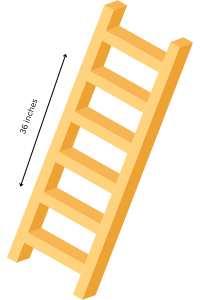
Small Step Ladder 36 Inches
Example 10: Fence Height
The deliberate selection of a 36-inch-tall fence encircling my property reflects a thoughtful balance between seclusion and the opportunity to observe the world beyond.
This particular height was chosen with precision to afford me the luxury of privacy while simultaneously granting a clear perspective of my surroundings.
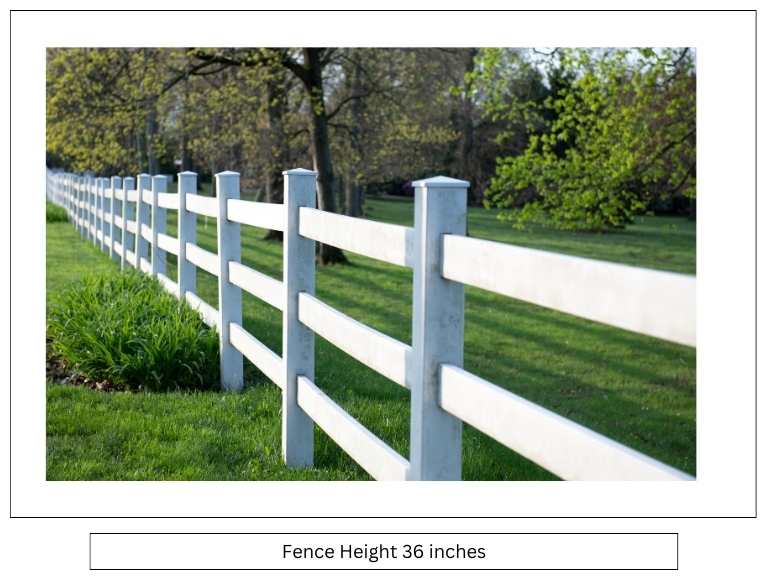
Converting 36 Inches: Exploring Other Units
The table below illustrates how 36 inches can be converted into different commonly used units of measurement:
| Unit of Measurement | Equivalent Value |
|---|---|
| Feet | 3 feet |
| Yards | 1 yard |
| Centimeters | 91.44 cm |
| Meters | 0.9144 m |
| Millimeters | 914.4 mm |
More units of measurements in detail:
| Unit | Equivalent in Yards |
|---|---|
| 36 inches to Nanometer | 914400000.0 nm |
| 36 inches to Micrometer | 914400.0 µm |
| 36 inches to Millimeter | 914.4 mm |
| 36 inches to Centimeter | 91.44 cm |
| 36 inches to Inch | 36.0 in |
| 36 inches to Foot | 3.0 ft |
| 36 inches to Yard | 1.0 yd |
| 36 inches to Meter | 0.9144 m |
| 36 inches to Kilometer | 0.0009144 km |
| 36 inches to Mile | 0.0005681818 mi |
| 36 inches to Nautical Mile | 0.0004937365 nmi |
Explanation:
- Nanometer (nm): 36 inches equals 914,400,000 nanometers. This incredibly tiny unit is often used for measuring things at the molecular or atomic level.
- Micrometer (µm): 36 inches equals 914,400 micrometers, also known as microns. Scientists and industries use micrometers for precise measurements on a small scale.
- Millimeter (mm): 36 inches is equivalent to 914.4 millimeters, commonly employed for precise measurements in engineering and manufacturing.
- Centimeter (cm): 36 inches equals 91.44 centimeters, commonly used for everyday measurements within the metric system.
- Inch (in): 36 inches are, quite simply, 36 inches. This unit is commonly used in the United States and some other countries following the imperial system.
- Foot (ft): 36 inches equals 3 feet, typically used for measuring height or short distances.
- Yard (yd): 36 inches equals 1 yard, often used for longer measurements, especially in construction.
- Meter (m): 36 inches is approximately 0.9144 meters, a fundamental unit of length in the metric system and used globally.
- Kilometer (km): 36 inches is about 0.0009144 kilometers, used for longer distances such as measuring roads or geographical features.
- Mile (mi): 36 inches is roughly 0.0005681818 miles, commonly used in the United States for longer distance measurements like driving or running.
- Nautical Mile (nmi): 36 inches is approximately 0.0004937365 nautical miles, primarily used in navigation and aviation to measure distances across the Earth’s surface.
This table presents a versatile array of length measurements, showcasing the various ways to express 36 inches. It serves as a valuable resource for comprehending this length in diverse contexts and for different purposes.
Beyond Linear Measurements: Thinking in 36 Inches
While 36 inches may be initially perceived as a unit of linear measurement, its versatility transcends beyond just one dimension, finding relevance and utility in various other aspects.
Circumference: Imagine you have a round table with a diameter of 36 inches. To find its boundary measurement, known as the circumference, you can employ the formula C = πd (where C stands for circumference, and d represents the diameter). This mathematical calculation proves particularly valuable in fields like geometry and interior design.
Volume: Now, picture a three-dimensional object, such as a box, with all sides measuring 36 inches each. This creates a cube with a volume of 36 cubic inches (36 in³). Visualizing this concept can help you grasp the idea of volume in various containers and shapes.
FAQs: Answering Common Questions
Q1: Does 36 inches equate to one meter?
Ans: No, 36 inches does not precisely equal one meter. To be exact, one meter is approximately 39.37 inches. This disparity is important to consider when converting between the Imperial and metric systems.
Q2: Can I employ a yardstick as an improvised measuring instrument?
Ans: Certainly! A yardstick, with its 36-inch length, serves as a versatile tool for swift measurements. Nevertheless, for utmost accuracy in your measurements, you might want to opt for more precise measuring instruments.
Q3: In which industries is 36 inches considered a standard measurement?
Ans: Indeed, there are numerous industries where 36 inches serves as a standard measurement. From construction to fashion design to woodworking, this measurement plays a pivotal role in the creation and construction processes.
In Conclusion
In this extensive manual, we’ve delved extensively into the realm of 36 inches.
In brief, 36 inches is equivalent to 3 feet, a crucial conversion in areas such as human stature, furniture size, and construction. This relationship bridges the gap between common objects and larger scales, making it fundamental for effective design and spatial perception. It underscores the importance of fractions in diverse practical scenarios.
The next time you’re about to hang a picture or decide on the size of a new TV, keep in mind the significance of 36 inches. Embrace the potential of this measurement!